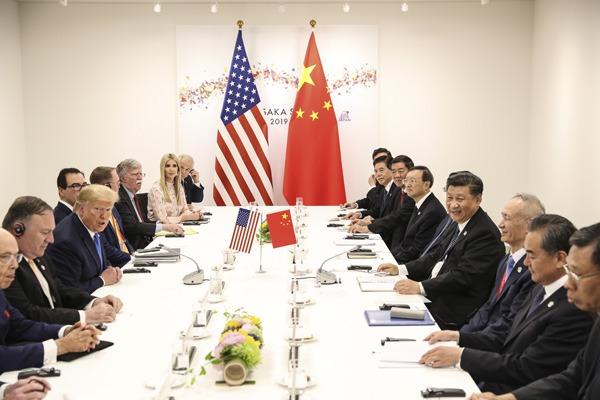Media Report

- The Wall Street Journal reports, "Top American and China negotiators are set to speak this week in an effort to revive stalled trade talks, as discord over prior commitments and political considerations threaten to bog down discussions. President Trump and Chinese President Xi Jinping agreed at the Group of 20 leading economies meeting in Osaka, Japan, in June to formally resume talks. Yet people following the process say that the issues that snagged talks two months ago remain. Among the sore spots: U.S. demands for China to buy more American agricultural and industrial products and to enforce protection of intellectual property and China's insistence that the U.S. remove tariffs on $250 billion in Chinese goods. 'One side or the other can always cave and talks can wrap very quickly, but, barring that, Osaka was conflict limitation, not conflict resolution,' said Derek Scissors, a resident scholar at the American Enterprise Institute think tank, who has consulted with the U.S. administration."
- The New York Times reports, "The United States has tentatively approved the sale of $2 billion in military hardware to Taiwan, demonstrating support for its unofficial ally in a move likely to exacerbate deteriorating ties between Washington and Beijing. The Defense Security Cooperation Agency, part of the United States Defense Department, notified Congress of two proposed arms sales on Monday. The first notification included 108 M1A2T Abrams tanks, as well as Hercules armored vehicles and heavy equipment transporters. The second included more than $220 million in Stinger antiaircraft missiles. The tentative approvals come as relations between the United States and China are already being tested by a trade war and the decoupling of technology supply chains. The armaments would provide Taiwan with greater deterrence capabilities against the growing military threat from China, experts said."
- The New York Times reports, "Hong Kong's embattled leader, Carrie Lam, made her most emphatic promise yet on Tuesday that a contentious extradition bill would not be revived, but she stopped short of offering further concessions to protesters, who rejected the gesture and set the stage for more demonstrations. Mrs. Lam, who said the bill was 'dead,' pledged to lead a government that would do a better job of listening to the public. But her refusal to give in to the protesters' latest demands showed she was betting on being able to ride out the demonstrations that have thrown the city into a political crisis, lawmakers and observers in Hong Kong said. Hundreds of thousands of people have taken to the streets in recent weeks, including in a march on Sunday, to oppose the bill, which would have allowed extraditions to mainland China. Tensions erupted last week when a relatively small group of protesters stormed and vandalized the city's legislature."
Calendar
- 2019-07-08 Hong Kong Protesters Take Their Message to Chinese Tourists
- 2019-07-07 That New Consensus on China? It's Wrong
- 2019-07-04 Trump Is Losing His Trade Wars
- 2019-07-03 China Snares Tourists’ Phones in Surveillance Dragnet by Adding Secret App
- 2019-07-02 Li Keqiang, Chinese Premier, Reaches Out to Trump and Business
- 2019-07-01 U.S.-China Trade Talks Are Back On but Obstacles Remain
- 2019-06-28 As Trump and Xi Talk Trade, Huawei Will Loom Large
- 2019-06-27 Huawei Hits Back at Claims It Steals Secrets
- 2019-06-26 ‘My Plan B Is Maybe My Plan A’: Trump Threatens New Tariffs on China
- 2019-06-25 Global Telecom Carriers Attacked by Suspected Chinese Hackers
News
- The Wall Street Journal U.S., China Tentatively Move to Revive Trade Talks
- The New York Times Taiwan Set to Receive $2 Billion in U.S. Arms, Drawing Ire From China Image
- The New York Times Hong Kong Leader, Carrie Lam, Says Extradition Bill Is 'Dead'
- Reuters U.S. to provide licenses for sales to Huawei if national security protected
- CNN China interrupts Hong Kong pop star during UN speech
- The Washington Post Banned at home, Twitter becomes a new tool for Chinese diplomats abroad
- CNBC Trump can't keep tariffs on China and win a second term, says researcher
- Reuters China's Xi tells officials not to be lazy and 'spend whole day eating'
- The Wall Street Journal China Sheds Millionaires as Slowdown Shaves Fortunes
- Reuters China's PLA signals it will keep Hong Kong-based troops in barracks
- Bloomberg China Watchers Look to Powell, Inflation Data for PBOC Clues
- Reuters China fines UniCredit AG unit $1.5 million for embezzlement
- CNN US imposes duties on some steel products from China and Mexico
Commentary
- The Wall Street Journal The Treaty Behind China's Drone Edge
- The New York Times The Extraordinary Power of Hong Kongers' Solidarity
- The Washington Post Why the United States doesn't need to return to a gentler China policy
- Bloomberg Taiwan's Politics of Pained Prosperity
- Foreign Policy Muslim Leaders Are Betraying the Uighurs
- The Washington Post Why the United States should sanction the mastermind of China's crackdown on the Uighurs